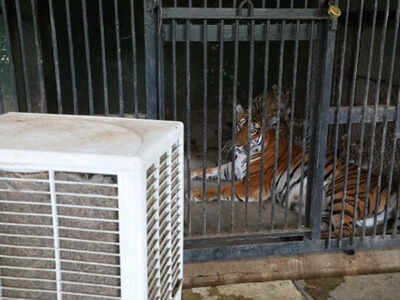
PUNE: From the top management to caretakers, everyone at Rajiv Gandhi Zoological Park in Katraj is doing everything possible to ensure the animals don’t suffer during the sweltering summer.
The India Meteorological Department (IMD) has issued heatwave alerts for most of the state, including Pune.
Siddharth Kamble takes care of the zoo’s nine tigers at the dedicated enclosure for the big cats. And on Saturday, the hottest day of this summer, he had to pull out all the stops to keep the tigers cool and hydrated. “Each of the cages in which the tigers are housed has a slab, where water is filled for them to drink. It is so hot that the tigers are often seen sitting on the water-filled slab to cool themselves,” Kamble told TOI.
For the nine tigers — including the four cubs born last October — the zoo authorities have deployed everything, from periodic water jets to conventional air-coolers and mist-fogging machines. The high-pressure mist fogging machines are deployed above the landscaped area adjacent to the cages, where the tigers roam or stretch. In the larger enclosure behind the cages, where the visitors to the zoo get to see the jungle cats, the authorities are clearing off dead grass and refilling the artificially created watering holes.
“They get tired very quickly in this heat,” Kamble said. “The cages are darker and much cooler, and because of the regular water jets and air-coolers, they prefer to stay inside these days,” he added.
Across at the much smaller leopard enclosure, the high cage grill over the landscaped area has ruled out any deployment of fogging machines, forcing the caretakers to bank on trees and water hoses.
“Whenever we jet the animals, they react aggressively, albeit from inside the cages. But that is the only way we can keep them cool in these conditions,” the caretaker in charge of the leopards said.
The India Meteorological Department (IMD) has issued heatwave alerts for most of the state, including Pune.
Water hoses are the most common way deployed to cool the animals down. The hoses are used mainly to fill watering holes or bathe some animals. In fact, the regular early morning baths, using hoses, given to the elephants at the zoo has become something of an attraction to visitors.
Siddharth Kamble takes care of the zoo’s nine tigers at the dedicated enclosure for the big cats. And on Saturday, the hottest day of this summer, he had to pull out all the stops to keep the tigers cool and hydrated. “Each of the cages in which the tigers are housed has a slab, where water is filled for them to drink. It is so hot that the tigers are often seen sitting on the water-filled slab to cool themselves,” Kamble told TOI.
For the nine tigers — including the four cubs born last October — the zoo authorities have deployed everything, from periodic water jets to conventional air-coolers and mist-fogging machines. The high-pressure mist fogging machines are deployed above the landscaped area adjacent to the cages, where the tigers roam or stretch. In the larger enclosure behind the cages, where the visitors to the zoo get to see the jungle cats, the authorities are clearing off dead grass and refilling the artificially created watering holes.
“They get tired very quickly in this heat,” Kamble said. “The cages are darker and much cooler, and because of the regular water jets and air-coolers, they prefer to stay inside these days,” he added.
Across at the much smaller leopard enclosure, the high cage grill over the landscaped area has ruled out any deployment of fogging machines, forcing the caretakers to bank on trees and water hoses.
“Whenever we jet the animals, they react aggressively, albeit from inside the cages. But that is the only way we can keep them cool in these conditions,” the caretaker in charge of the leopards said.
#ElectionsWithTimes
more from times of india cities
Quick Links
Lok Sabha Election Schedule 2019Lok Sabha Election NewsDelhi Capitals teamMI team 2019Rajasthan Royals 2019RCB team 2019Maharashtra Lok Sabha ConstituenciesBJP Candidate ListBJP List 2019 TamilnaduShiv Sena List 2019AP BJP List 2019Mamata BanerjeeBJP List 2019 MaharashtraPriyanka GandhiBJP List 2019 KarnatakaAMMK Candidate List 2019BJP List 2019 WBLok Sabha Elections in Tamil NaduBSP List 2019 UPNews in TamilLok Sabha Poll 2019Satta Matka 2018PM ModiMahagathbandhanNagpur BJP Candidate ListChandrababu NaiduTamil Nadu ElectionsUrmila MatondkarNews in TeluguMadras High CourtTejashwi YadavArvind KejriwalTejasvi SuryaPawan KalyanArvind KejriwalYogi AdityanathJaya PradaSatta King 2019Srinagar encounter
Get the app











